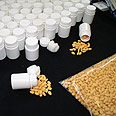
Israel a counterfeiters' paradise
Israel scores well above world average in trade of forged merchandise: Medication, food, apparel, alcohol and everything in between
One night, a group of friends went out clubbing. The drinks inside the club were too expensive, so they bought some alcohol at the kiosk around the corner.
While the drunkenness was no different than usual, the headache was much worse, and the vomiting followed shortly after. Less than 24 hours later, all was forgotten, but the body still remembered – the alcohol they purchased was fake – otherwise how could they explain a glass of vodka that only costs a few shekels?
A fake looks just like the original, but is much cheaper. It is often made by amateurs and is not subject to any inspection or state regulation.
"According to our estimates, the fake goods industry in Israel boasts revenues amounting to some NIS 1 billion (about $260 million) annually," said attorney Tal Yitzhak Ron, who specializes in commercial law and intellectual property.
"Fakes represent 7% of the goods industry in the world, and 10% in Israel," Ron said, "Fake alcohol is an inferior good that can lead to long-term health problems. It can contain unfamiliar coloring and flavor agents that are not always produced in sterile conditions, and often made in illegal refineries."
Attorney Ron claims one can be sold fake alcohol anywhere, anytime – in pubs, kiosks and even catering companies at weddings.
"The refilling phenomenon is the most common forgery method," Ron explained, "The empty bottle is returned to the wedding hall, and transferred to the counterfeiters. Vodka is the easiest alcohol to forge because many cannot tell the difference in flavor. Bar and restaurant owners often actively cooperate or turn a blind eye when purchasing alcohol from unofficial sources or pass the empty bottles along."
The consumer has a hard time detecting the fakes because the bottles are often original, but might have a fake expiry date.
Product forgery is an attractive business, as it enormously increases profit margins and is fairly easy to do. Importers try to battle the phenomenon, while the State tries to thwart forgeries via Customs, and runs an intellectual property unit, which is part of the Economic Crimes Unit that targets individuals suspected of fraud, forgery, neglect, tax evasion as well as copyright and trademark infringement.
Fake labels, dangerous tomatoes
"Brand importers detect counterfeiters and ask us to issue an injunction," said attorney Ron. "We carry out dramatic raids with police and security officers and are amazed to discover how fake whiskey resembles the original, although sometimes you also find labels that were printed with spelling mistakes."
"The problem," Ron added, "is that police have many good intentions, but not enough manpower, so even if I managed to intercept a container with 4,000 fake bottles, the odds of intercepting it a second time are so low that the manufacturer will continue selling fake Vodka."
Fruit and vegetables cannot be forged, but those looking to turn a quick profit often find dangerous loopholes.
"People sell merchandise in the open market that does not meet the standards required in the State of Israel," claimed Ruti Shapir, director of Lab-Path, a private institute that checks the quality of fruit and vegetables.
"Many think: What's the big deal? A tomato is a tomato; but I've examined enough tomatoes to know that many have faults that can harm public health, such as spraying with prohibited materials or not enough time elapsing between spraying and picking the vegetable," Shapir said.
The state is planning to enforce regulations according to the Ministry of Agriculture's standard law that is slowly being drafted. But many other products in the field of food and nutrition are subject to forgery – from coffee and honey, to fish, meat and of course drugs.
The World Health Organization estimates that 12.5% of medications in the world are counterfeit. This number includes products that are intentionally marketed with the right ingredients, but with forged packaging that lists other ingredients that do not actually exist in the product.










